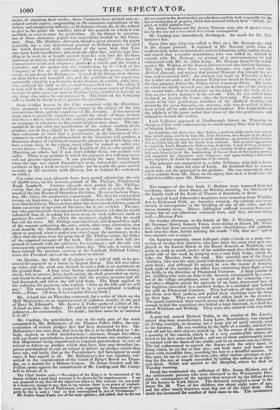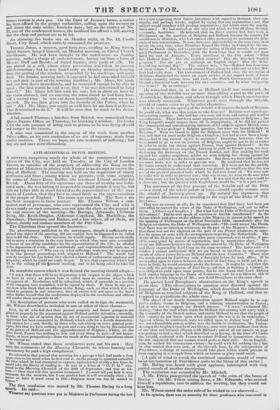The remains of the late Lady C. Barham were removed
from her residence, Queen Anne Street, on Monday morning, for interment in the funnily vault of the Earls of Thanet at Rainham, in Kent.
As two of Lord Sidmouth's daughters were returning from Wimble- don to Richmond Park, on Saturday evening, the carriage was over- turned, in consequence of the breaking of one of the reins, and the horses running away. Misses Addington suffered severely from con- tusion, but are not otherwise seriously hurt, and they are now doing well.—Morning Post.
On Sunday:afternoon, as the family of Mr. J. Winslow, engraver, 46, Seymour Street, Somers Town, were sitting at dinner, Mr. Wins- low, who had been conversing with great cheerfulness, fell suddenly back into his chair, faintly uttering the words " Oh, dear me !" and in two minutes was a corpse.
On Saturday morning, about half-past eight o'clock, as a gang, con. sisting of twenty-four convicts, who have been for some time past em- ployed in the Lower Marsh in the Royal Arsenal, at Woolwich, was going to work as usual, twelve of the number made for a field on the op- posite side of the road, by jumping over a very high hedge, which di- vides the Marshes from the road. The sentinel, one of the Royal
Artillery, who was the only guard with them (save the keeper) immedi- ately fired ; and although he missed, he was the means of bringing
back eight of the number, the other four continuing their flight across the fields, in the direction of Plumstead Common. A large portion of the Artillery who were on duty in the Arsenal, accompanied by a num- ber of the village neighbours, went in pursuit of the remaining Cour ; and after a diligent search for upwards of an hour, discovered two of the fugitives concealed in a quickset hedge, in a secluded spot behind the mill on Plumstead Common. They had taken off their shirts and
put them over their jackets, and pulled their stockings over the irons on their legs. They were secured and taken back to the Arsenal. The guard continued their search across the fields, and were fortunate enough to find the remaining two behind a large haystack, in a field be- tween Wickham and Welling. They were also secured with very little difficulty.
A poor lad, named Richard Noble, in the employ of Mr. Laurie, patent ship-hose manufacturer, Long Lane, Bermondsey, was engaged
on Friday sennight, in cleaning out a large pot of spirit varnish, used
in the business. He was working by the light of a candle, and bad his coat off and his shirt sleeves tucked up. In the course of the operation, a quantity of the varnish, which is of a very combustible nature, ad- hered to his bare arms and hands; and one of them unfortunately came in contact with the flame of the candle, and in an instant was in a blaze. The lad endeavoured to quench the flames with the other hand; in
doing which, he set fire to that also; and both arms and hands now burnt with incredible fury, scorching his face in a dreadful manner. In this state, he ran to one of the men, who, after various attempts at put- ting the fire out, at length succeeded by rolling the sufferer in an adja- cent ditch. Noble was carried to the Hospital, where he died on Tuesday morning. Death has terminated the sufferings of Mrs. Susan Herbert, one of the unfortunate persons who were conveyed to the Westminster Hos- pital in consequence of the injuries they received by. the falling down of the houses in York. Street. The deceased occupied a room in the house No. 26. Two of her children, one about eight years of age, and the other nearly fourteen, were dug out of .the ruins dead. Her death has increased the number of fatal cases to six. " The condemned houses remain in state quo. On the front of Jesson's house, a notice has been affixed by the proper authorities, calling upon the owners to pull down the same within fourteen days ; but on the shutter of No. 27, one of the condemned houses, the landlord has affixed a bill, stating that the shop and parlour are to be let.
An alarming fire broke out on Monday night, at No. 12, Castle Street, City Road, which entirely consumed the premises.
Thomas Johns, a weaver, aged forty-two, residing in King Street, Spital Square, hanged himself, on Monday morning, in Christ Church watchhouse. He had been brought to the watehhouse on Sunday morning, under a charge of embezzlement, having cut from a loom of Messrs. Duff and Brooks, of Spitul Square, sixty yards of silk. He was placed in a cell, where every precaution was taken to prevent self-destruction; but he was found early on Monday morning hanging from the grating of the window, suspended by his stockings, and quite dead. On Sunday morning early it appeared he had suspended himself to a quil jack [a part of the weaving machine] ; Mr. ?aye, his land- lord, cut him down immediately, and he recovered enough to be able to speak ; the first words he said were, that "" he was determined to hang himself." Mr. Moye left him with his son; but in about an hour he was again alarmed, and on entering the room found he had hung him- self a second time : he was cut down immediately, and once more re- covered. He was then given into the custody of the Police, when he said " Ah ! Mr. Moye, you might as well have let me done it at first— lam determined to do it." It will be seen that he stuck to his deter- mination.
A lad named Thomas, a butcher, from Bristol, was committed from Queen Square Office, on Thursday, for breaking a window. He broke it for the sole purpose of being sent to prison, as he was dying of cold and hunger in the streets.
A man was committed in the course of the week from another Police-office, on his own confession of an act of vagrancy, made from similar motives. These, we hope, are rare instances of suffering; but they are sad ones notwithstanding.



























 Previous page
Previous page